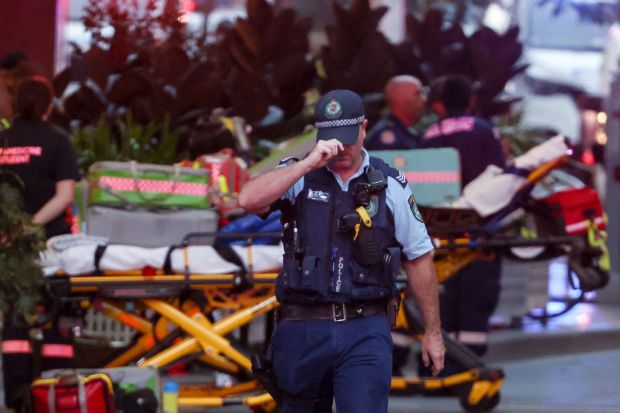While the main electoral attraction of the moment is the French presidential showdown between Emmanuel Macron and Marine Le Pen, it is not the only significant election underway in the western world.
On 21 May, Australia goes to the polls. The contest is between the nominally centre-right coalition of the Liberal and National parties led by prime minister Scott Morrison, and the Australian Labor party led by a long-term, socialist left-wing MP, Anthony Albanese.
On the face of it, Morrison should be re-elected on his record. In his three-year term, he has seen Australia through natural disasters, including the massive bushfires affecting the south-east of the country in 2019 and early 2020, and just now floods inundating large parts of New South Wales and Queensland. More particularly, Morrison presided over a national Covid response which – although it turned Australia into a hermit kingdom for the best part of two years – kept Covid infections exceptionally low compared to the UK and Europe. In his campaign pitch, Morrison points out that, if Australia had comparable Covid rates to its northern hemisphere counterparts, 40,000 more Australians would have died, as opposed to 6,500.
Furthermore, the Australian economy is surging. Australia went into a Covid recession for just one quarter, GDP has surged past 2019 levels, and unemployment is just 4 per cent, the lowest it’s been in half a century. Internationally, Morrison hasn’t been afraid to stand up to China’s geopolitical bullying, and lately has been a staunch friend of Ukraine.
In achieving these results, however, Morrison made serious mistakes.
He took his family on holiday to Hawaii when the 2019 bushfire crisis was at its hottest. ‘I don’t hold a hose mate,’ he told a bushfire-affected community. He managed a series of sex and bullying scandals affecting his government and the Australian parliament clumsily, notoriously citing his wife’s advice ‘as a woman.’
When Covid hit, the national constitution left the real power to deal with pandemics with lockdown-happy state premiers, who overreached with heavy-handed public health measures. They suppressed personal freedoms in a way that made Boris Johnson’s now-infamous lockdown rules look tame. Morrison, however, struggled to use the ‘bully pulpit’ of the prime ministership to impose truly national leadership and curb the states’ excesses. And what was directly in his power – such as approving, obtaining and distributing vaccines – was handled less than well. Politically, Morrison allowed himself to become the convenient scapegoat for everything that went wrong with Covid, even for things beyond his direct control.
Morrison’s Liberal-National government has also been in office for three terms (with three prime ministers), sideshows like the Novak Djokovic visa fiasco have caused international embarrassment, and Morrison’s Liberal party is at factional war with itself. Morrison himself is reviled by the left, and his mostly transactional politics have alienated many of his conservative base and driven them to splinter parties. Concerningly for his electoral prospects, the massive support for jobs and families his government funded in 2020 when the private sector economy was all but shut down has brought Morrison little electoral reward.
Thus, in the first week of the election campaign, all public opinion polls have Morrison’s governing centre-right coalition significantly behind Albanese’s Labor. This election is Albanese’s to lose.
How to describe Albanese? He is a 25-year MP from the hard-left faction on the Labor party. In his youth, he was a special adviser to his mentor Tom Uren, a similarly far left-wing minister in the Bob Hawke and Paul Keating Labor governments, who used his ministerial office to undermine the soft-edged, but realist, economic Thatcherism of his own governments. A senior minister in the tumultuous revolving premierships of Kevin Rudd and Julia Gillard, Albanese owed his allegiance to whichever of these bitter enemies was prime minister at the time, as long as they continued to lavish billions of other people’s money on grand infrastructure projects.
And Albanese, having finally become Labor leader on his second attempt, cast around for role models and settled on Jeremy Corbyn.
Indeed, Albanese and Corbyn became friends, and in 2019 Albanese didn’t hesitate to tweet a selfie with the then Labour leader, two brothers in socialist arms.
As leader, and going into this election, Albanese has sought to remake himself as a safe, centrist, social democrat. Having undermined and reviled reforms that have underpinned Australia’s economic prosperity and resilience for the last three decades, he now hails Hawke, Keating, and the Liberal reformist prime minister John Howard, as heroes. He has sharpened his image and found a good tailor, lost weight and sought to look the prime ministerial part. But he hasn’t disowned his radical socialist past.
Despite his first campaign week from hell, where a series of own goals – ranging from not knowing fundamental economic figures to overegging his CV, and with no coherent policy besides spending much more on health and social services – Albanese remains, for now, favourite to win in May. Many Australians are tired of constant crisis and either, often unfairly, blame Morrison for this, or, as with Churchill and Attlee in 1945, simply want a fresh leader and programme for a post-Covid world.
Thanks to Albanese’s self-inflicted major cock-ups this week, Morrison may yet pull off a second electoral miracle for his party. But it’s clear many Australians either aren’t put off by Albanese’s hard left roots and personal values, or simply don’t care. And an antipodean Corbynite’s election victory could only give heart to Corbyn’s ostracised Labour followers in Britain.
Got something to add? Join the discussion and comment below.
Get 10 issues for just $10
Subscribe to The Spectator Australia today for the next 10 magazine issues, plus full online access, for just $10.



















Comments
Don't miss out
Join the conversation with other Spectator Australia readers. Subscribe to leave a comment.
SUBSCRIBEAlready a subscriber? Log in